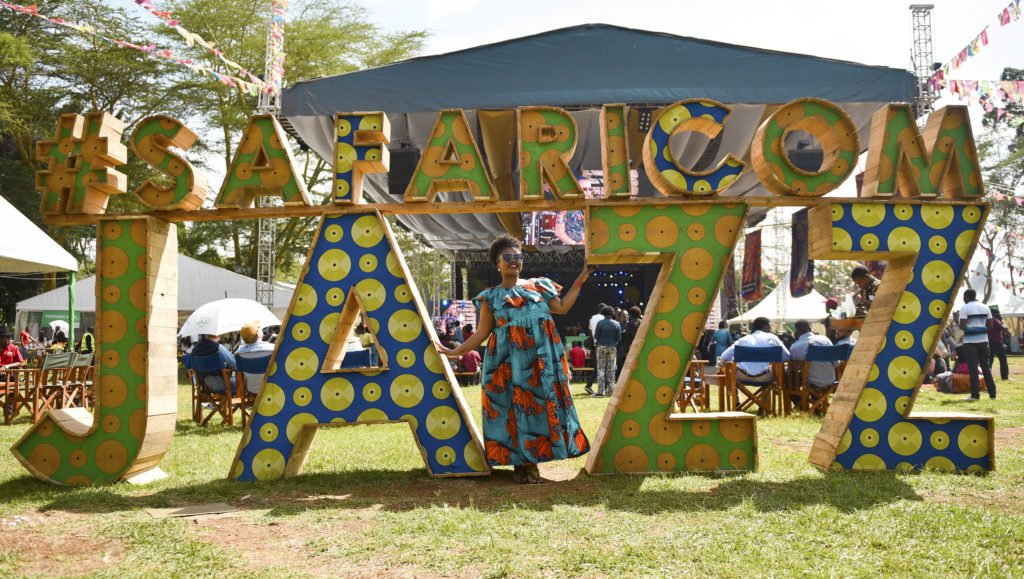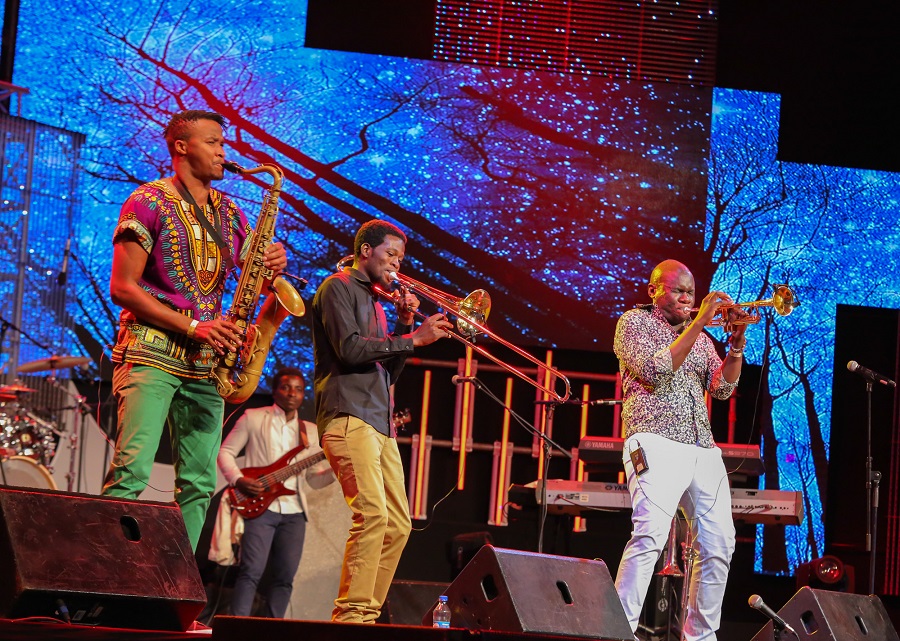In Conversation with Afro Jazz Legend Cheick Tidiane Seck

When I received the email with the line-up for the Safaricom Jazz International Jazz Day celebrations in Nairobi, I was over the moon. The headlining artistes were Paco Sery and Cheick Tidiane Zack. On the day of the meet and greet, the beneficiaries of the proceeds from the Safaricom International Jazz Festival, Ghetto Classics, started us off with a performance that was a beautiful reminder of what supporting these wonderfully talented kids has produced.
Later, Paco Sery gave a humorous speech through his translator. Cheick Tidiane Seck then went up to give a little speech and Paco Sery went up on stage to basically accompany him on the piano, which was both hilarious and brilliant. They jammed together too and by the time Cheick invited a girl from Ghetto Classics to sing with him, I was in awe at the effortless brilliance.
I was ushered into the VIP waiting room for my interview and there was the man himself, Cheick Tidiane Seck, a larger than life personality with a warm demeanour. It’s no wonder he is referred to as the Black Buddha. Cheick was born in 1953 in Mali, and is a prolific multi-instrumentalist, singer and composer with an impressive repertoire. He has collaborated with legends such as Salif Keita, Mory Kante, Fela Kuti, Youssou N’Dour, Hank Jones, Carlos Santana and Joe Zawinul just to name a few.
1. What has your musical journey been like?
I grew up in Mali and my love for music was inspired by my mother. She had me at 50 and had a beautiful singing voice. She never wanted any of her music recorded, but I’d say her voice was similar to that of Aretha Franklin. I began performing in the early 70s with bands like the successful Rail Band du Buffet Hotel de la Gare in Bamako with Mory Kante and Salif Keita. I fought against the Malian military and was imprisoned three times, and in 1978 I moved to Ivory Coast where I played with different bands and toured the region. I lived in Ivory Coast for 6 years, and then left for France with Salif Keita for a series of international shows. I did move back to Mali in 1983 and stayed for 2 years, but then moved to Paris in 1985 where I’ve been ever since.
I continued to play with Salif Keita, both in Les Ambassadeurs, but also on various solo projects of Keita’s, such as the successful album Soro. I also collaborated on my 1995 album Sarala with the jazz great Hank Jones. I have worked on numerous albums and collaborated with artistes across different genres from jazz to pop to hiphop including Randy Weston, Coleman, Mos Def, The Black Eyed Peas, Carlos Santana and Gorillaz. I am also a visiting professor at UCLA.
I have lived many lives through music and if I go into more details, we’ll be here all day. Yes, it’s true that I have worked across different genres, but I still describe myself as an Afro Jazz musician.
2. What is your definition of Afro Jazz?
Afro Jazz is what I did with Hank Jones for my album Sarala. It’s the jazz inspired by African tradition.
Jazz is African music. The legendary Yusuf Latiff once told me he hates the name jazz and preferred to call it African music. Same to Randy Weston the jazz pianist legend, who up until the day he died, wanted to be referred to as an African musician. I’ve also fought for forty years against the world music category as it places African music in a limited category, There is pressure to be placed in a category, so when I must, I describe my music as Afro Jazz. I could say it’s a style of meeting of Mali music with what you have here in the form of Chakacha. We as African musicians are creators at the same level as Mozart and Bach. I am not a jazz musician, I am music.
3. What has been your experience living as a black expat in France?
It’s not been easy as being African does come with challenges, but I’ve fought hard to take up space. It does help that I am a recognised successful musician, but I have never stopped fighting for Africa.
4. What is your creative process like?
It’s very spontaneous. Sometimes the music comes from a meeting with someone or from an experience. My inspiration is from community and the fight by African people for their rights. I am still a rebel at heart even as I get older. I am a believer in the words of James Brown, “Say it loud! I’m black and I’m proud.” We must be proud of who we are and what we have to offer the world.
5. What work/project are you most proud of?
I never got to do it. I’ve played with almost everyone I have wanted to work with and created a lot of music I am proud of, but I would have loved to record with my mother. Rather than carry it as a source of frustration, it has become a focus point to try and transcend myself.
6. What project can your fans look forward to?
I am working on three albums: My piano solo with Mali tradition music, my trio album and a Randy Weston tribute album that will be coming out in September. I am also trying to produce some kids from Mali, Burkina Faso to help up bring up the next generation. I will also be performing at various festivals in the coming year.
7. You held a master class with the kids from Ghetto Classics, what was your impression of the program?
It was wonderful for me. I was going to just talk with them but I decided to make them play Mali music from my album and they did so well. There’s a little girl with a beautiful voice who started to sing, she’s the one that was on stage with me earlier. I am going to make sure that she sings in my next album.
http://www.mwendengao.com/2019/05/07/in-conversation-with-afro-jazz-legend-cheick-tidiane-seck/Creative of the WeekLifestyleMusicCheick Tidiane Seck,Ghetto Classics,Safaricom International Jazz Festival,Safaricom Jazz



Leave a Reply